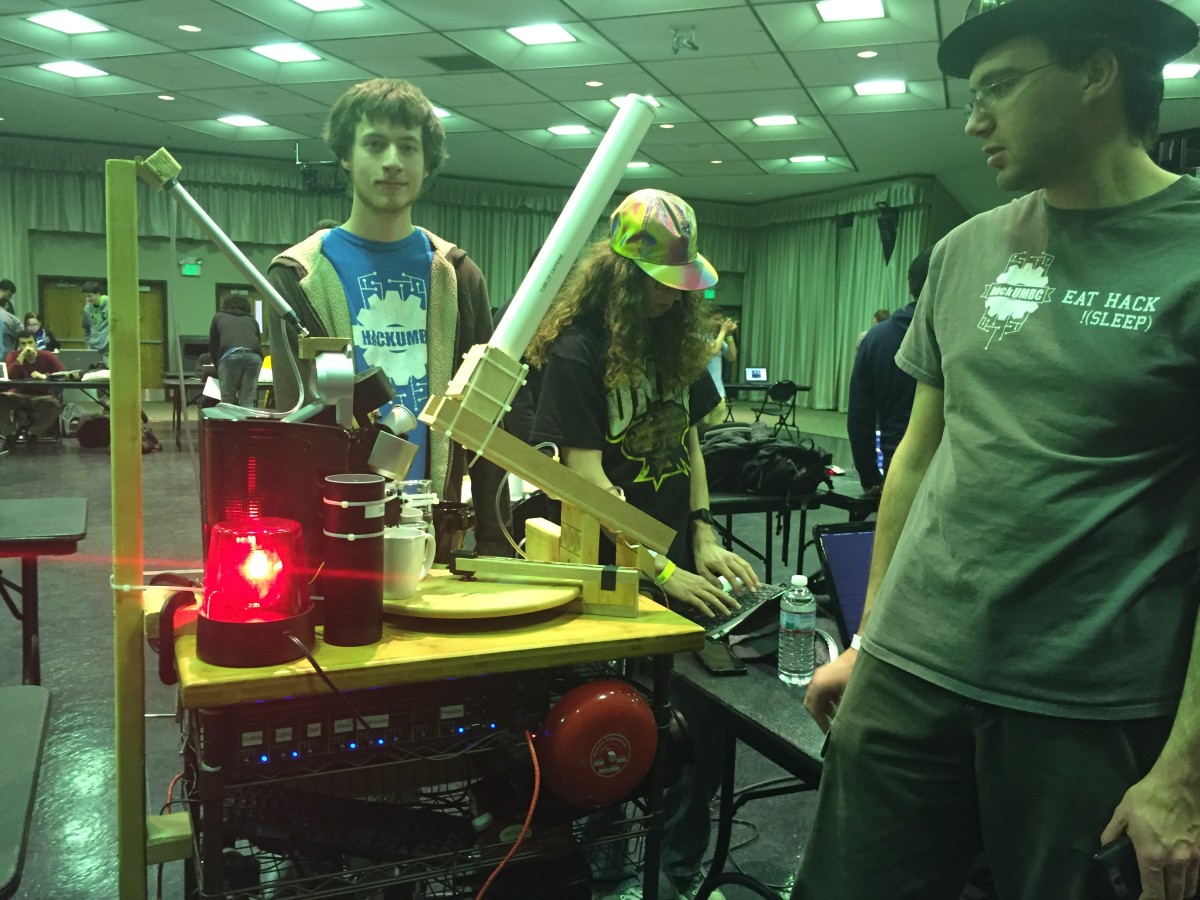One group of college students wanted to build something to get their coffee ready. Another found a way to connect music, art and science through Leap Motion.
Close to 50 teams came out to HackUMBC this weekend to dig into projects. Here are five projects that stood out.
1. Rart
There were plenty of UMBC students involved, like Toni DeGuzman and Christopher Mills. The pair made a smart resume platform called Rart. The app guides a job-seeker through the process of building a resume, and filters out skills that are relevant to the specific job for which they are applying.

“A lot of people I know are like, ‘Oh man, I have to make a resume, I have to sign for an internship.’ So the idea came out of that need,” said Mills.
While they got the app up and running over the 24 hour event, DeGuzman said they see the potential to add more templates.
2. DJ Treegasm
“I had a dream where we would combine every single form of art in existence into one form,” said Wuqiong Fan. He initially thought they could hack a poem. But then the rest of the team, which also included Kevin Miller, Eric Herbert and Nat Baylon, brought the Leap Motion into the fold.
“Instead of using a poem, what if we used our hands instead,” said Fan.
With DJ Treegasm, moving a hand above the Leap Motion sensor allows the user to control both the pitch of a digital sound, and a design on a laptop screen. Raising a hand makes the pitch go higher. A pinch controls the volume.
“Normally, people dance to the beat of music. With this, music follows the dance,” said Fan.
3. Hacked Together Coffee Pot Control Protocol

Winner of the longest name, this project from Zachariah Dzielinski, Zachary Stewart, Mark Murnane and Alexander Bauer was a hit both for its size and stack.
The HTCPCP is an early answer to a world that is not yet George Jetson-automated. The base is a Keurig machine, which includes a turntable for coffee cups. The K-Cups, move down through a PVC tube. When the coffee is ready, an alarm bell sounds to wake you up. And it’s voice-controlled with an Amazon Echo. Welcome to the hacked-together future.
4. Elections apps
Being the vertical where college kids have hit it big in the past (and now spend a lot of time), social media was a popular hack — and the timing of the event meant that the presidential election took center stage.
One app that combined the two elements was Twitter Critic. The quartet of Nathaniel Self, Nicholas Kibbey, Jeffrey Feng and Brandon Ginkemeyer created a program that plots reaction to a specific account’s tweets. They mapped Donald Trump — and he was all over the map. The clearest demonstration came with Leonardo DiCaprio’s account, whose positive reaction peaked last week when he finally won an Oscar.
Another app, called Electoral Roast, maps the negative fodder being said about any candidate. The project from Alexander Kyei, Cole Alban, Nick Hays and Michael Wittner is designed to help see where in the U.S. a candidate’s support or opposition is clustered.
5. Lots of Holes

A walk around the final showcase of projects on Sunday revealed that some teams were made up of high school students who traveled from Northern Virginia and the D.C. suburbs.
Among those was the team of Sharvil Pharekh, Vineet Shah and Rushad Antia. They made the trip from Montgomery County, Md. Their project made use of the accelerometer on an Android phone. Lots of Holes is designed to sense when a car goes over a pothole. Then, the app automatically reports that pothole and the measure of the size, and locates it onto Google Maps. Once the app is in many phones, the team wants it to give pothole fillers a crowdsourced priority list.
The team had car trouble, though. So, in order to test the app, they cut a hole in a pizza box and gathered some materials together from the hackathon for a model car.







